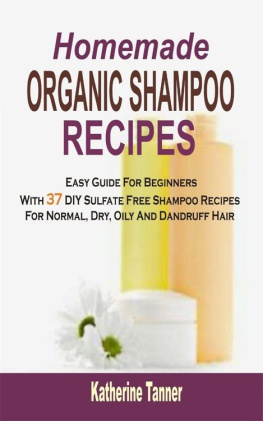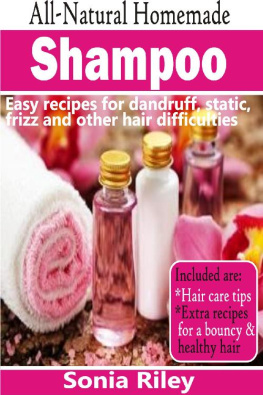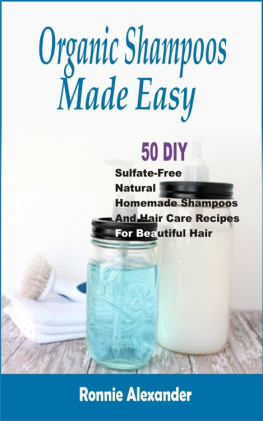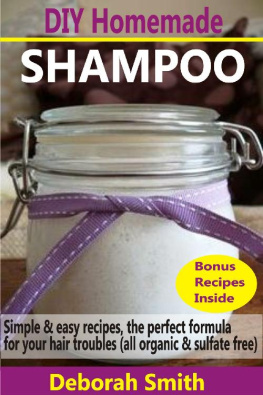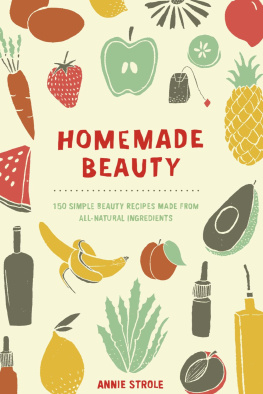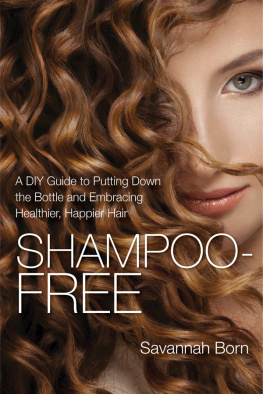Homemade Organic Shampoo Recipes Easy Guide For Beginners With 37 DIY Sulfate Free Shampoo Recipes For Normal, Dry, Oily And Dandruff Hair Katherine Tanner Copyright 2014 By Katherine Tanner All rights reserved. No part of this publication may be reproduced, distributed, or transmitted in any form or by any means, including photocopying, recording, or other electronic or mechanical methods, without the prior written permission of the publisher, except in the case of brief quotations embodied in critical reviews and certain other noncommercial uses permitted by copyright law. Table Of Contents
Introduction
If you have been around homemade natural body care for some time, making your own hair care products is not new to you. With the instructions and recipes in this book, you will learn how to easily make effective and inexpensive shampoos. Many of the 37 recipes contain herbs and essential oils with a variety of healing and therapeutic benefits for your hair and scalp. It is true that there are thousands of commercial products on the market that promise to do wonders for your hair.
However, going completely natural is important if you want to eliminate the danger of using chemicals with known and unknown harmful side effects on your scalp and hair.
Benefits Of Homemade Natural Shampoo
Before going into the steps for making homemade natural shampoos, you should be clear about why you should make the switch to this option. Better For Your Hair And Scalp Commercial shampoos and conditioners contain a long list of chemicals with strange-sounding names. What these companies put in their personal care products are not fully regulated by the FDA. This means that the potential harmful effects of these chemicals are not even known. Many of these products have been found to contain ingredients that are linked to allergies, immunotoxicity, cancer and more.
When you go fully natural, you will make shampoo that is safer for yourself and your family because you will only be using natural ingredients. Better Effectiveness Although this point may be subjective, it is very valid for a lot of people. Many people have discovered that their hair feels and looks better when they switched to homemade natural shampoo. A few others have not been so lucky. How well DIY shampoo works is dependent on your hair type and the recipes that you use. This is why many recipes in this book have been clearly labeled so you can know the hair type they are most suitable for.
Be ready to experiment by trying a few of these recipes before making up your mind about homemade shampoo...and there is a good chance you may be hooked from the first try! Money Saving Like most DIY home projects, making your own shampoos will save you a lot of money. Homemade shampoo is a fraction of the cost of commercial store bought shampoo. This is especially beneficial if you have a large family. Good For The Environment When you wash your hair, the product goes down the drain. Using commercial shampoo means you are adding more chemicals to the pollution of the environment. This is not so with homemade natural shampoo because all the ingredients are completely biodegradable.
Good For Your Home The longevity of the pipes in your home can be reduced by harsh chemicals. Although the damage caused by pouring harsh chemicals down the drain will happen over time, it will still be money out of your pocket. Making your own shampoo at home will help you to prolong the lifespan of your plumbing and also protect the planet.
The Challenge Of Switching To Homemade Natural Shampoo
Making an effective natural shampoo comes with some challenges. If you don't choose the appropriate combination of ingredients, homemade shampoo may weigh down fine hair or make oily hair look greasy. One of the main differences between commercial and natural hair shampoo is that commercial manufacturers provide the correct balance of ingredients for the hair without drying it out or weighing it down.
This is because they have spent a lot of resources and time on trial and error. Homemade shampoo also feels differently compared to store bought shampoo. Commercial shampoos contain chemicals that create foamy bubbles abundantly to give the impression of greater effectiveness. However, the production of lather is not a measure of the cleanliness produced. Some of the recipes in this book do not produce lather and they are still very effective in cleaning hair. Therefore when you start using homemade natural shampoo, give yourself some time to adjust to the different experience.
After a couple of weeks, check the results and evaluate the change in the texture of your hair. Try a few of the recipes before coming to a conclusion. I hope you will be glad you made the switch. Homemade shampoo is more effective if you follow it with a vinegar hair rinse. This balances your hair's pH and reduces product buildup. Furthermore, resist the temptation of washing too frequently.
Washing your hair too frequently will strip it of its natural defenses. Once every two days or twice a week is enough for most hair types.
HOMEMADE HERBAL SHAMPOOS
Shiny Hair Shampoo
Use this lively and fragrant recipe to bring out the shine of your hair. Ingredients: 1/4 cup of distilled water 1/4 cup of liquid castile soap (scented or unscented) 2 tablespoons sweet almond oil 2 tablespoons dried rosemary 1/4 teaspoon lemon essential oil Directions: 1. Boil a cup of water then add the rosemary. 2. 2.
Strain out the leaves then allow the liquid to cool. 3. Mix the other ingredients together then stir into the rosemary water. 4. Store in a clean bottle. 5. 5.
Use as your regular shampoo. Rinse well.
Rejuvenating Shampoo For All Hair Types
Use this wonderful shampoo to add more life to tired looking hair. Ingredients: 1/4 cup of distilled water 1/4 cup of liquid castile soap (scented or unscented) 1/2 teaspoon grapeseed or jojoba oil 1 tablespoon lemongrass 3 tablespoons rosemary 1 teaspoon vanilla essential oil 2 teaspoon tea tree essential oil Directions: 1. Boil a cup of water then add the lemongrass and rosemary. 2. 2.
Strain out the leaves then allow the liquid to cool. 3. Mix the other ingredients together then stir into the herb water. 4. Store in a clean bottle. 5. 5.
Use as your regular shampoo. Rinse well.
Green Tea Shampoo
Ingredients: 1 gallon brewed tea 1/4 cup castile soap 1/2 cup baking soda 3 teaspoon xanthan gum 30 drops essential oils (optional) Directions: 1. Brew the tea by steeping about 6 bags in hot water for 10 minutes. 2. Remove tea bags then stir in baking soda.
Let cool for some time. 3. Whisk in the xanthan gum slowly then follow with the castile soap and essential oil. 4. Transfer to a water jug and pour some in an empty bottle for the bathroom. 5.
Use as your regular shampoo. Rinse well.
Mixed Herbs Tea Shampoo
This works well on most hair types. Ingredients: 3/4 cup distilled water 1 tablespoon dried peppermint 1 tablespoon dried lavender 1 tablespoon dried nettle 1 tablespoon dried rosemary 1/4 cup liquid castile soap 1/2 teaspoon salt 1 tablespoon witch hazel 8 drops of essential oil (optional) Directions: 1. Boil water then add the dried herbs. 2. 2.
Strain out the herbs then allow the liquid to cool. 3. To the liquid, add castile soap, salt, witch hazel and essential oil (if using). 4. Stir together and transfer to a squeeze bottle. 5. 5.
Use once a week as regular shampoo, followed by an apple cider vinegar rinse.
AROMATHERAPY SHAMPOOS
Add essential oils to your homemade natural shampoos to boost their cleaning and healing power and to also give them wonderful scents.
Aromatherapy Shampoo For Oily Hair I
Use this to soften your hair and Eliminate Greasiness Ingredients: 1/2 cup of liquid castile soap 1/4 cup of canned coconut milk 1/4 cup of honey 2 tablespoon fractionated coconut oil 1 tablespoon vitamin E oil 30 drops wild orange essential oil 20 drops lavender essential oil Directions: 1. Mix all the ingredients together. 2. Store in a clean bottle.
Next page
